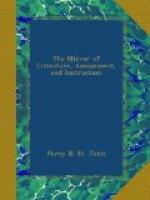* * * * *
ENNUI OF FASHION.
It must be owned that five years form an awful lapse in human life:—a lapse whose hours and minutes leave no where a trace more sharp and injurious than on the minds and countenances of individuals involved in the buzzing, stinging gnatswarms of fashionable life. Elsewhere, existence marches with a more dignified step, and the scenes pictured among the records of our memory assume a grander aspect; they lie in masses,—their shadows are broader,—their lights more brilliantly thrown out. But reminiscences of a life of ton are as vexatious as they are frivolous. The season of 1829 differs from that of 1830, only inasmuch as its quadrilles are varied with galoppes as well as waltzes, and danced at Lady A.’s and Lady B.’s,—instead of the Duchess of D.’s, and Countess E.’s. The Duchess is dead,—the Countess ruined;—but no matter!—there are still plenty of balls to be had. “Another and another still succeeds!” Since young ladies will grow up to be presented, lady-mothers and aunts must continue to project breakfasts, water parties, and galas, whereby to throw them in the way of flirtation, courtship, and marriage. Mischief, in her most smiling mask, sits like the beautiful witch in Thalaba at an everlasting spinning-wheel, weaving a mingled yarn of sin and sorrow for the daughters of Fashion. Although the cauldron of Hecate and her priestesses has vanished from the heath at Forres, it bubbles in nightly incantations among the elm-trees of Grosvenor Square; and Hopper and Hellway, Puckle and Straddling, now croak forth their chorus of rejoicing where golden lamps swing blazing over the ecarte tables, and the soft strains of the Mazurka enervate the atmosphere of the gorgeous temples of May Fair. Never yet was there a woman really improved in attraction by mingling with the motley throng of the beau monde. She may learn to dress better, to step more gracefully; her head may assume a more elegant turn, her conversation become more polished, her air more distinguished;—but in point of attraction she acquires nothing. Her simplicity of mind departs;—her generous, confiding impulses of character are lost;—she is no longer inclined to interpret favourably of men and things,—she listens without believing,—sees without admiring; has suffered persecution without learning mercy;—and been taught to mistrust the candour of others by the forfeiture of her own. The freshness of her disposition has vanished with the freshness of her complexion; hard lines are perceptible in her very soul, and crowsfeet contract her very fancy. No longer pure and fair as the statue of alabaster, her beauty, like that of some painted waxen effigy, is tawdry and meretricious. It is not alone the rouge upon the cheek and the false tresses adorning the forehead, which repel the ardour of admiration; it is the artificiality of mind with which such efforts are connected that breaks the spell of beauty.




